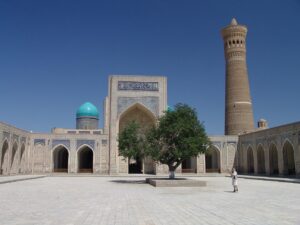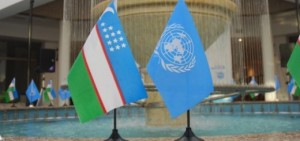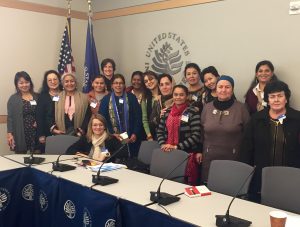The Central Asia Program hosts several initiatives focused on specific areas of research and development. The initiatives promote a better understanding of the religions, politics, economies, and cultures of the region.
 The Central Eurasia-Religion in International Affairs (CERIA) initiative promotes better understanding of religion as a “societal shaper” that has broader implications in shaping politics, economy, and culture for Central Eurasian societies. The CERIA initiative is generously funded by the Henry Luce Foundation.
The Central Eurasia-Religion in International Affairs (CERIA) initiative promotes better understanding of religion as a “societal shaper” that has broader implications in shaping politics, economy, and culture for Central Eurasian societies. The CERIA initiative is generously funded by the Henry Luce Foundation.

The Central Asia Program hopes to contribute to the study of ‘cultures’ of Central Asia as living dynamics, functioning in interaction with politics and the economy, and reflecting current social changes in the region.
 The Central Asia Program participates in the policy debate on Central Asia by offering a fresh look at the main policy issues, such as the future of the US Silk Road Strategy in the wake of the withdrawal from Afghanistan, and the stakes of forthcoming presidential successions in Uzbekistan and Kazakhstan.
The Central Asia Program participates in the policy debate on Central Asia by offering a fresh look at the main policy issues, such as the future of the US Silk Road Strategy in the wake of the withdrawal from Afghanistan, and the stakes of forthcoming presidential successions in Uzbekistan and Kazakhstan.

The CAP Economic Forum aims to foster interaction between the business community, academia and the policy world. Foreign investors have become key actors in Central Asian economic, social and political landscapes, but their roles are often disparaged or not recognized, and their acquired knowledge of local realities inadequately integrated into policy formation and scholarly analysis.
 The Uyghurs are one of the ten most populous stateless nations in the world. While they have a long history of cultural accomplishments and political influence, they have remained marginal in international scholarship given their ambiguous position both in regional studies and in geopolitics.
The Uyghurs are one of the ten most populous stateless nations in the world. While they have a long history of cultural accomplishments and political influence, they have remained marginal in international scholarship given their ambiguous position both in regional studies and in geopolitics.
 While Kazakhstan is enjoying time in the limelight on the international stage and arousing the interest of business and diplomatic communities in Europe and the United States, scholarly research on the Kazakh society remains fragmented. This initiative fills this void by providing a space for peer-discussion, and consolidating a cohort of young and mid-career experts generating innovative research on Kazakh society and culture.
While Kazakhstan is enjoying time in the limelight on the international stage and arousing the interest of business and diplomatic communities in Europe and the United States, scholarly research on the Kazakh society remains fragmented. This initiative fills this void by providing a space for peer-discussion, and consolidating a cohort of young and mid-career experts generating innovative research on Kazakh society and culture.
 The goal of the Uzbekistan Initiative is to create an apolitical platform of discussion and knowledge exchanges that promotes Uzbek culture and society beyond the divergences in assessing its current course. It gives a platform to scholars from diverse disciplines, journalists, cultural and political activists, diaspora groups and official representatives of the country, with the hope of creating a space for discussion and interaction.
The goal of the Uzbekistan Initiative is to create an apolitical platform of discussion and knowledge exchanges that promotes Uzbek culture and society beyond the divergences in assessing its current course. It gives a platform to scholars from diverse disciplines, journalists, cultural and political activists, diaspora groups and official representatives of the country, with the hope of creating a space for discussion and interaction.
 This project brings together young female social entrepreneurs and activists from Kyrgyzstan, Tajikistan, Afghanistan, Pakistan and India, to discuss their experiences and innovative solutions on community-level water management, enhance their competencies and leadership skills, and expose them to U.S institutions and the policy community working on water management and gender issues.
This project brings together young female social entrepreneurs and activists from Kyrgyzstan, Tajikistan, Afghanistan, Pakistan and India, to discuss their experiences and innovative solutions on community-level water management, enhance their competencies and leadership skills, and expose them to U.S institutions and the policy community working on water management and gender issues.

